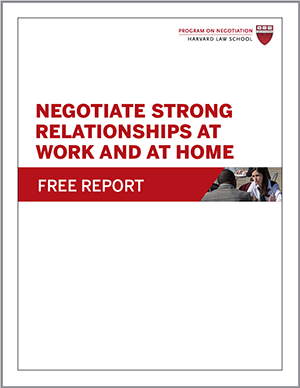
After buying a new car, you’re eager to sell your old car. It looks well kept, but you had problems with the engine last winter. Now it’s late summer. Should you tell prospective buyers about the engine, which might or might not act up when the weather turns? How do you handle this in negotiation?
Negotiation Ethics: An Oxymoron?
Some people believe that the concept of “negotiator ethics” is an oxymoron—that you need to do whatever it takes to achieve your goals.
Ethics at the Bargaining Table: Always Applicable or Situational?
Others argue that negotiators should tell the truth, the whole truth, at all times. Most negotiators fall between these two extremes, striving to be as candid as possible while reserving the option to withhold key information about their positions.
Your sense of what’s appropriate may fluctuate depending on the bargaining context and the parties involved.
How can you minimize the likelihood that you and your counterpart will resort to ethically ambiguous tactics?
Here are six strategies to help you navigate ethical dilemmas at the bargaining table:
Negotiation Strategy 1. Consider the context.
The implied social norms, or widely expected guidelines for behavior, of the negotiation situation at hand heavily influence the degree to which negotiators will behave ethically. Most of us expect less honesty (on both sides) in a used-car negotiation, for example, than in a salary negotiation or in the formation of a long-term business partnership. Before you negotiate, assess what standards might apply and whether your counterpart will have the same norms in mind. Advise your subordinates to pay attention to these issues, and keep in mind that organizational pressures to “just do what it takes to get the job done” can easily separate a negotiator from his ethical standards.
Negotiation Strategy 2. Build a relationship with the other side.
Negotiators are less likely to use ethically ambiguous tactics when they know their counterpart well, trust her, and understand that the relationship will be seriously damaged if the other party discovers the unethical behavior, according to research by Maurice Schweitzer of the University of Pennsylvania. For these reasons, try to get to know your counterpart and invest in building—and not endangering—the relationship.
Negotiation Strategy 3. Commit explicitly to honesty and openness.
When unethical behavior is a possibility, make a commitment to your counterpart before talks begin. Inform him that you intend to conduct yourself in a fair and honorable manner and then ask him to do the same. Explain that you’d rather hear the truth than have to try to detect bluffs, and promise to give him the same courtesy.
Negotiation Strategy 4. Negotiate in person.
Research by Roy J. Lewicki of The Ohio State University and Brian Dineen of the University of Kentucky has shown that direct face-to-face contact between parties lowers the use of ethically ambiguous tactics compared with similar negotiations conducted by phone, e-mail, or other forms of long-distance communication.
Negotiation Strategy 5. Deal with the principal.
A negotiator who serves as an agent for someone else is more likely to resort to ethically ambiguous tactics than when serving as the principal. If you suspect that an attorney or other agent is acting unethically, ask to meet with her principal. Similarly, be prepared to talk directly with other negotiators if you are being represented by an agent.
Negotiation Strategy 6. Trust, but verify.
When you don’t know your counterpart very well and suspect he may be deceiving you, it never hurts to ask for written verification of statements and commitments. Ideally, your relationship will develop to the extent that such proof isn’t necessary. In the interim, however, written evidence can clarify misunderstandings, sharpen previously undetected points of ambiguity, and help both parties feel confident that the agreement will remain intact and unaffected by less-than-truthful declarations.
Are there any strategies that are missing? Let us know what you think in the comments.
Originally published January 2010. Adapted from “Walk the Line: Ethical Dilemmas in Negotiation,” by Roy J. Lewicki (Professor, The Ohio State University), first published in the Negotiation newsletter.





Being self-employed and trying to make sales each week, having to walk far places to earn some money and not getting sales. Makes me want to stay on the right path and keep going. Hope that makes sense.